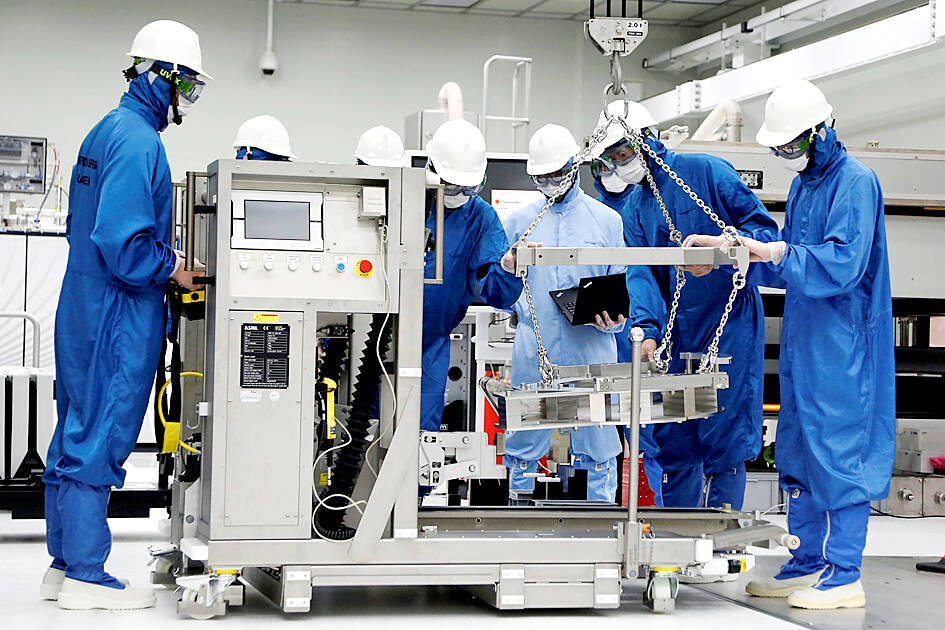The semiconductor industry is facing a talent shortage as the proportion of university students majoring in science, technology, engineering and mathematics (STEM) fields has been declining, a report by the Legislative Yuan said.
Subjects in STEM fields include life science, environmental science, physical chemistry, earth science, mathematics, information and communication technology, engineering, manufacturing and processing, as well as building and construction engineering, the Ministry of Education said.
The proportion of STEM students in colleges and universities, as well as STEM graduates in recent years are far lower than those in 1991, the report prepared by the legislature’s Budget Center said.

Photo: Ann Wang, Reuters
The number of doctoral, master’s and undergraduate students studying in STEM fields dropped by 17.15 percent from 2012 to 2021, and the number of graduates fell by 21.31 percent from 2011 to 2020, the report said.
The number of doctoral students in STEM fields declined by 26.34 percent from 2012 to 2021 and the number of doctorate holders reduced by 23.63 percent from 2011 to 2020, it said.
The proportion of doctoral, master’s and undergraduate students in STEM fields among total students from 2012 to 2021 dropped by 8.9, 1.51 and 1.77 percentage points respectively from 2011 to 2020, it said.
In response to the talent shortage in STEM fields, the ministry has designated semiconductor, artificial intelligence, smart manufacturing, circular economy and finance sectors as “national key fields,” it said.
The ministry approved 10 research institutes in these fields set up by nine universities as of the end of July last year, it said.
National Yang Ming Chiao Tung University, National Cheng Kung University, National Tsing Hua University and National Taiwan University have established semiconductor research institutes, it said.
National Sun Yat-sen University has established semiconductor and finance research institutes; National Taiwan University of Science and Technology has established artificial intelligence and smart manufacturing research institutes; National Chung Hsing University has established a circular economy research institute; and National Taipei University of Technology has established an artificial intelligence research institute, it added.
As these institutes are in preliminary stages, the effectiveness remains to be seen, it said.
Talent shortages in the semiconductor industry have been expanding, it said, citing white papers on talent in the semiconductor industry released by 104 Job Bank.
Research and development engineers are the most important roles businesses that are undergoing transformation seek to fill, it said.
However, a lack of students and graduates, especially at the doctorate level, in the STEM fields could exacerbate the shortages, it added.

‘DENIAL DEFENSE’: The US would increase its military presence with uncrewed ships, and submarines, while boosting defense in the Indo-Pacific, a Pete Hegseth memo said The US is reorienting its military strategy to focus primarily on deterring a potential Chinese invasion of Taiwan, a memo signed by US Secretary of Defense Pete Hegseth showed. The memo also called on Taiwan to increase its defense spending. The document, known as the “Interim National Defense Strategic Guidance,” was distributed this month and detailed the national defense plans of US President Donald Trump’s administration, an article in the Washington Post said on Saturday. It outlines how the US can prepare for a potential war with China and defend itself from threats in the “near abroad,” including Greenland and the Panama

The Chinese Nationalist Party (KMT) is maintaining close ties with Beijing, the Democratic Progressive Party (DPP) said yesterday, hours after a new round of Chinese military drills in the Taiwan Strait began. Political parties in a democracy have a responsibility to be loyal to the nation and defend its sovereignty, DPP spokesman Justin Wu (吳崢) told a news conference in Taipei. His comments came hours after Beijing announced via Chinese state media that the Chinese People’s Liberation Army’s Eastern Theater Command was holding large-scale drills simulating a multi-pronged attack on Taiwan. Contrary to the KMT’s claims that it is staunchly anti-communist, KMT Deputy

RESPONSE: The government would investigate incidents of Taiwanese entertainers in China promoting CCP propaganda online in contravention of the law, the source said Taiwanese entertainers living in China who are found to have contravened cross-strait regulations or collaborated with the Chinese Communist Party (CCP) could be subject to fines, a source said on Sunday. Several Taiwanese entertainers have posted on the social media platform Sina Weibo saying that Taiwan “must be returned” to China, and sharing news articles from Chinese state media. In response, the Mainland Affairs Council (MAC) has asked the Ministry of Culture to investigate whether the entertainers had contravened any laws, and asked for them to be questioned upon their return to Taiwan, an official familiar with the matter said. To curb repeated

Myanmar has turned down an offer of assistance from Taiwanese search-and-rescue teams after a magnitude 7.7 earthquake struck the nation on Friday last week, saying other international aid is sufficient, the National Fire Agency said yesterday. More than 1,700 have been killed and 3,400 injured in the quake that struck near the central Myanmar city of Mandalay early on Friday afternoon, followed minutes later by a magnitude 6.7 aftershock. Worldwide, 13 international search-and-rescue teams have been deployed, with another 13 teams mobilizing, the agency said. Taiwan’s search-and-rescue teams were on standby, but have since been told to stand down, as